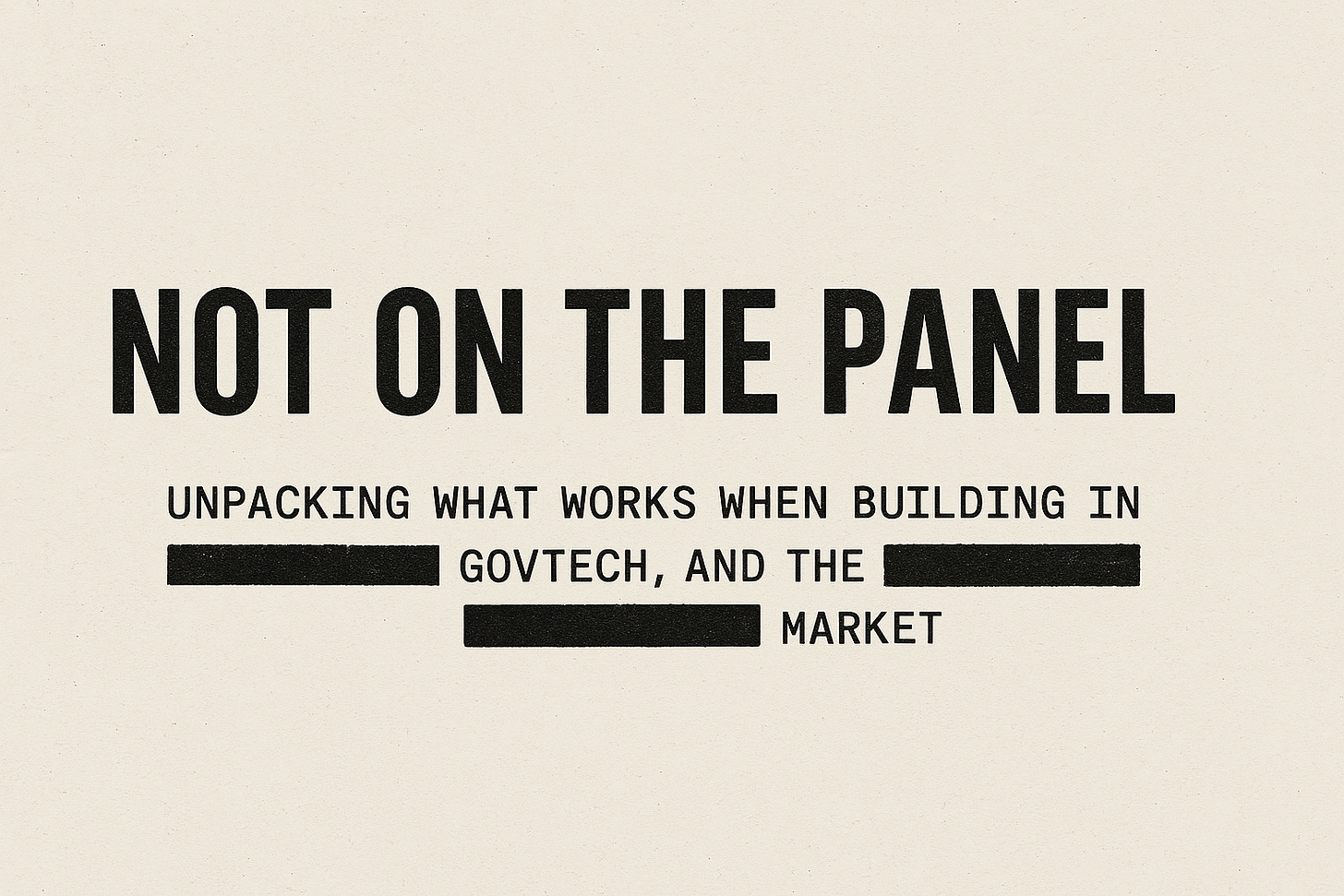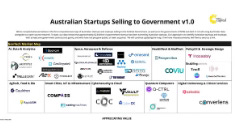Not on the Panel
Unpacking what works when building in ███ ██████, GovTech, and the █████████ market.
👋 Welcome
A quick hello to our three newest members and a massive shoutout to Overnight Success for signalling our work on Saturday.
You’re here because you suspect what we know to be true: the real power, the real scale, isn’t in consumer tech. It’s in the $2.3 trillion global government market.
Most founders and investors see the government as a blocker. We see it as a broken system, full of backdoors, waiting for someone with the correct map.
Not on the Panel is that map. Each week, we track the deals, decode the jargon, and expose the opportunities in Australia’s $80B B2G sector. We’re here to help you break in, not just knock on the door.
That is also why we’re building what we believe is Australia’s first B2G angel syndicate. We are backing the founders who see the system for what it is: the biggest platform for innovation that no one is talking about.
Think you have what it takes? Let's build.
(Heads up: We're now aiming for a Monday drop)
In this week’s edition, we explore:
Australia’s growing national security ecosystem, and our ongoing love affair with non-Australian companies
An expanding international outlook on GovTech and public policy
And in our major feature:
We unlock another Selling to Government Myth, and how a simple Google Search can be used to justify locking Australian startups out of multi-million dollar deals
🤝 If you value our unique perspective, help us grow by sharing it with your network. Every new subscriber brings us closer to delivering more in-depth coverage of the overlooked and undervalued B2G market.
📰 This Week in Global GovTecch
🇦🇺 Australia
🤖 Services Australia Refines Public Data for AI Use
Services Australia adjusts public data to guide external AI tools effectively, ensuring accurate and ethical information dissemination. Ensuring that automation and AI benefit customers and staff.
🔗 Read more
Source: The Mandarin
🧠 Ayres Advocates AI for National Capability Over Profit
Newly appointed Innovation Minister Tim Ayres says AI should strengthen the nation, not just cut costs, and warns against outsourcing Australia’s digital advantage. (Let’s not tell him how much tech we already offshore 😬… see below.)
Source: The Mandarin
🏥 South Australia Launches $28M AI Initiative
The South Australian government will spend $28 million over four years on AI trials in healthcare, policing, and public services to boost efficiency, safety, and decision-making.
Source: Department of Treasury and Finance
🛡️ Victoria Considers Defence Tech Focus for VC Fund
InnovationAus is reporting that discussions are underway about whether Breakthrough Victoria should add a sixth investment priority to its remit. The fund currently focuses on five core areas: health and life sciences, agri-food, clean economy, advanced manufacturing, and digital technologies.
Source: InnovationAus.com
🔬 Queensland Invests $1B in PsiQuantum for Quantum Computer
Queensland and federal governments commit nearly $1B to build the world's first fault-tolerant quantum computer in Brisbane.
Source: Australian Financial Review
🌐 Global
💰 Anduril Raises $2.5B, Valuation Soars to $30.5B
Defence tech startup Anduril secures $2.5B in Series G funding, doubling its valuation and expanding its technological capabilities.
🔗 Read more
🧬 U.S. Senate Ties State AI Law Limits to $500M Broadband Fund
The U.S. Senate softened a proposed 10-year ban on state AI laws, linking restrictions instead to eligibility for $500M in broadband funding.
🔗 Read more
🔬 UK Commits £86B to Science and Tech R&D
Investment to drive advancements in AI and sustainability sectors, bolstering the UK's position in global innovation.
🔗 Read more
💼 This Week in Australian B2G
(Week Ending 6 June)
📄 $635.32m in total reported contract spend
🖥️ $86.44m in software + digital services + I.T (*new)
Breakdown by Service:
💾 Software: $23.80m
☁️ SaaS (Cloud): $459k
🛠️ Software maintenance & support: $31.54m
🧱 Platform SaaS: $0k
⚙️ Software/hardware engineering: $348k
💻 I.T $30.3m
Breakdown by Procurement Method
📢 Open Tender: $31.43m
🗃️ Prequalified Tender: $0
📩 Limited Tender: $55.0m
* AusTender is not known for clean data, primarily because of the inconsistent and often low-quality contract information agencies submit. So this week, we’ve introduced a new I.T category as a temporary catchall. It is not perfect, but we are working through the mess to make the data actually transparent.
GovTech Flex
Ping Identity Corporation secured its largest contract to date with a three-year, $7 million deal with the Australian Signals Directorate. Since 2023, the company has won $13.1 million in federal contracts, continuing the trend of offshore firms outperforming local players.
DigiCert Limited increased the value of its federal contracts, securing a new $220,000 deal with the Department of the Prime Minister and Cabinet, bringing its total to approximately $3.17 million. $1.39 million of that total was awarded in the last 18 months under exemption 10.3.d.iii — supply by a particular business due to an absence of competition for technical reasons.
Babel Street also picked up another contract extension with the Australian Signals Directorate, this time worth $1.7 million. They have been remarkably consistent, securing similarly sized deals over the past three years and bringing their total to $12 million since 2007. Just one more offshore company thriving in Australia’s national security ecosystem
🧱Build Better
🔑 You’re Not a Competitor. You’re the Scenery.
Let’s be blunt. The single most important rule for winning a government contract is to stop reading the rulebook.
The first and most expensive mistake you can make is thinking the Commonwealth Procurement Rules are a playbook for winning. They are not. They are an internal instruction manual for public servants on how to justify their buying decisions. Because you're reading the government's internal manual, the language is fundamentally misleading. You see ‘Open Tender’ and assume it’s a fair race for everyone. It’s not. You see ‘Limited Tender’ and think it’s an exclusive panel you can’t join. Wrong again. ‘Limited’ is the government’s code for skipping a public race entirely. This is where the real game is played, and it's not in the book you've been reading.
The market scan can be as simple as a Google search that shows no apparent alternatives.
While you are fighting for scraps, savvy firms are using a private entrance. They know the real game is in the exceptions, and crucially, they understand how weakly those exceptions are policed.
Their master key is a specific clause: 10.3.d.iii. Don't worry about the number; worry about what it lets them do. It allows them to bypass a tender entirely when there is an:
"absence of competition for technical reasons"
Here is the billion-dollar secret: there is no rigorous, mandated process a government delegate must follow to prove this. The market scan can be as simple as a Google search that shows no obvious alternatives.
This isn't just a flaw in the system; it's a continuously open tap. If you read our lead analysis in this edition, you already know that another ~$3 million just flowed through it to overseas players.
In this system, you’re not meant to be the winner; you’re meant to be the scenery that makes the game look fair.
Once a company achieves this status, it triggers a rinse-and-repeat cycle. The first win creates a defensible precedent. For the public servant, re-engaging the now “proven” sole supplier is the safest and easiest path. This is how multi-year, multi-million dollar relationships are built without ever facing a real competitor.
So when you lose your next bid, don't ask what was wrong with your application. Ask if there was ever a real competition to begin with. Because in this system, you’re not meant to be the winner; you’re meant to be the scenery that makes the game look fair.
But that reality isn't a life sentence. It's a diagnosis.
Once you know how the system actually works, you can build a strategy to beat it. This requires better intelligence, a different strategy, and a community dedicated to playing the real game.
That is why we are building our B2G Syndicate: to bring together investors and founders to back the next generation of Australian companies that will scale with government, not around it. We are continuously tracking the data on these loopholes and contracts to give our portfolio an unfair advantage.
🗺️ Our Government Market Map
For founders, the journey starts with a simple truth: Government can buy from you.
To prove it, we've built Part 1 of our market map: a live logo board showing the Aussie startups, by category, that are currently engaged in government contracts. Not all are landing huge deals; some are just getting started. But it’s the definitive proof that a pathway exists.
We're already working on successive layers of intelligence: adding contract values so you can see the scale and building a sister map of the overseas competitors you're really up against. You can start here by seeing which Aussie startups are in the game.
This market deserves sharper focus, better data, and real momentum. We are here for all of it.
📣 Are you a Startup Selling to the Government, or want to?
Each week, more than 1,500 federal contracts are published on AusTender. We track what we can, but we cannot review every supplier to identify which companies are startups.
If you’re:
Tendering for government work
Already delivering to a government customer
Recently awarded a contract
We want to hear from you.
You don't need a press release; leave a comment below or get in touch with us.
We are always looking for stories that help explain what is actually happening in the B2G and GovTech markets.
📄 Method and Scope
Each week, we track reported contract data from AusTender, the Commonwealth government’s procurement reporting system. Our focus is on contracts classified under software, SaaS, and digital services, as these categories are most relevant to technology founders building with or for government.
AusTender publishes thousands of contract notices each week across a wide range of categories. While we rely on this data as our primary source, we cannot guarantee the accuracy or timeliness of individual listings.
We do not attempt to cover every sector or supplier. However, if a startup is awarded a contract and we can verify it, we will include it, regardless of classification. These stories help surface where momentum exists and where future opportunity may lie.
✍️Meet the Editor
Hi, I'm Mat, a Startup advisor, former bureaucrat, investor, and lifelong procurement tragic.
Throughout my career, I’ve worked on four of the Commonwealth's most significant non-defence contracts. I remain frustrated that early-stage companies are often excluded from the government market.
This Substack is part of how I’m building in public. I work with founders and investors who see the $80 billion business-to-government opportunity in Australia.
We also support founders in essential but often overlooked areas, such as governance, risk, and strategy.
If you’re a founder looking to break into government or seeking opportunities to back generational companies in this space, please don't hesitate to reach out. I’m always up for a coffee.







